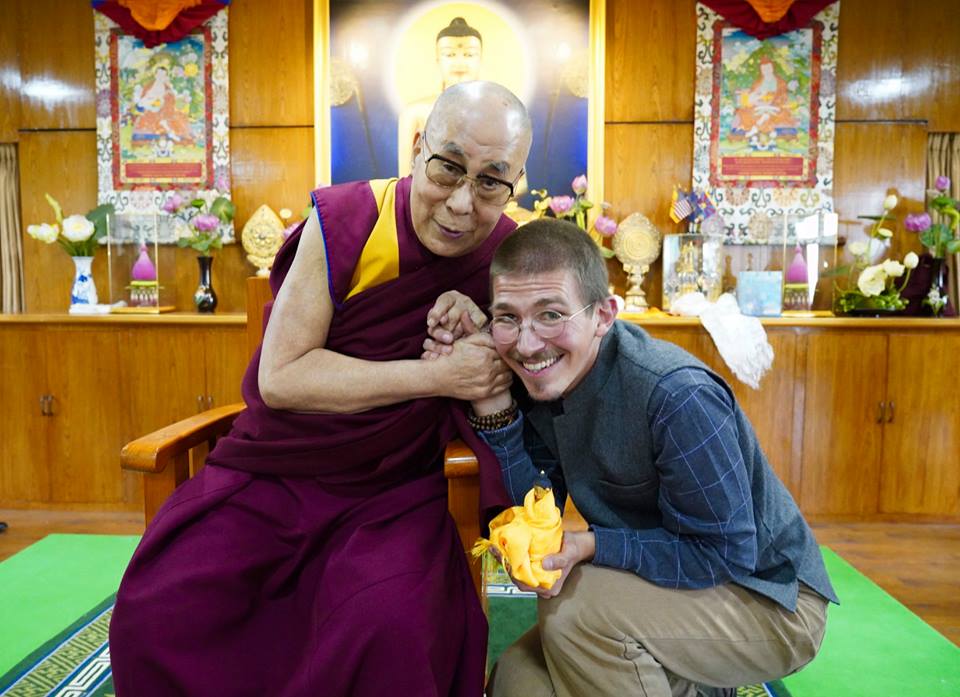
The first place in India he visited was Tushita Meditation Center situated in Dharamshala that is the residence of His Holiness the Dalai Lama in exile. He decided to stay. A couple of years later this tall, handsome man with an aura of a monk is a meditation teacher for foreign students like me. Renato Unterberg (30) is a successful musician from Salzburg for whom, however, fame and glory are not as tempting as the potential and goodness of the mind.
At home you had your own band, thousands of fans, beautiful and comfortable life. Yet, you withdrew from all this and went to a meditation center in India. How did you end up there?
I always wanted to be a musician or an actor, to entertain people and do things that are beneficial for others. I had the luxury to do what I liked for a very long time: I had good financial background, I could create music, I was on stage performing. However, the more I kept doing this, living the rock`n`roll lifestyle, the more I felt the urge to find something beyond that.
So, after a while I asked myself, “ok, what´s next?”
And what was next?
A dear friend of mine recommended me to come to India and check out this buddhist course in Dharamshala. As I finally did, from the very first moment it was very clear to me that this was what I needed in my life and what I was looking for. It seemed to be such a clear spiritual path! And the deeper I go, the clearer it is becoming to me.
You know, to create art is one thing, it can take you quiet far within yourself, but the spiritual path and these buddhist teachings just hit another spot for me. Once you know what you want and the opportunity comes then you`ve got to take it.
How can we recognize the right path for ourselves as clearly as you did? How come most of us fail to see it so clearly?
Of course it depends on the individual. I think the most important thing is to listen. What do I truly wish for? What do I truly want to do in my life? These are fundamental questions and mostly we have no idea what we really want and how great our inner potential actually is. Moreover, sadly many people don´t believe in their inner voice and are not really confident that they can achieve what they envision for their lives.
Isn´t it rather a rational decision what I do with my life?
Well, you cannot really control life, can you? You can plan to some degree, but it is questionable if that works out. Life is not fixed, how rational can you really be?
What would you recommend then?
You have to carefully compose your own highest vision of yourself and then go for it as best as you can. If things don´t work out and obstacles arise you have to be flexible, redirecting yourself into that direction again and again. It´s all about openness in the present together with a clear vision; If you do not achieve your vision in one way, you´ve got to go about it differently. Reality itself is flexible, we have to work with it.
How did your family react to your life change?
My mother is an artist and she´s very open towards spirituality. Since I was 14-15 years old we shared artistic views and spiritual matters as well. Later she also became a Buddhist. My dad is very open minded too. Of course, some of my relatives are a little bit skeptical; but my parents accepted it and that gives me security.
Lucky you! Many young people do not have such tolerant parents.
I know that for most people that is a difficulty. Parents often tell you what to do. Yet, I believe we can accept it as a challenge to break this somewhat. If you have certainty within, then others will slowly get used to it and you just keep on doing what you do no matter what people say. We have to develop certainty though.
What did you like about Buddhism in the very beginning?
Firstly, that inherently we are good and that we all have Buddha potential; everyone has the potential to awaken, we are all equal in our potential to become Buddhas. That leads to second thing that resonated with me: the concept of emptiness, in other words the totally dependent existence of all phenomena. There is a very good book from His Holiness the Dalai Lama called “How To See Yourself As You Really Are” that clicked with me in the beginning. From that I went on.
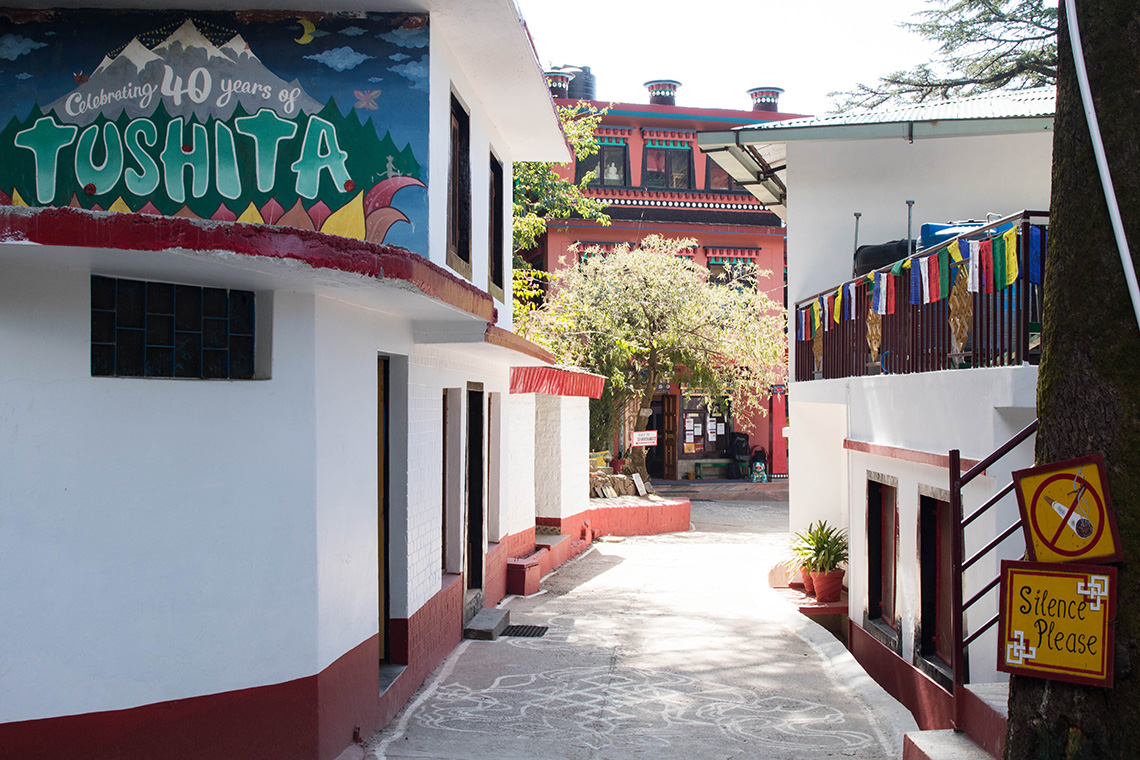
Tushita Meditation Center, McLeod Ganj, India
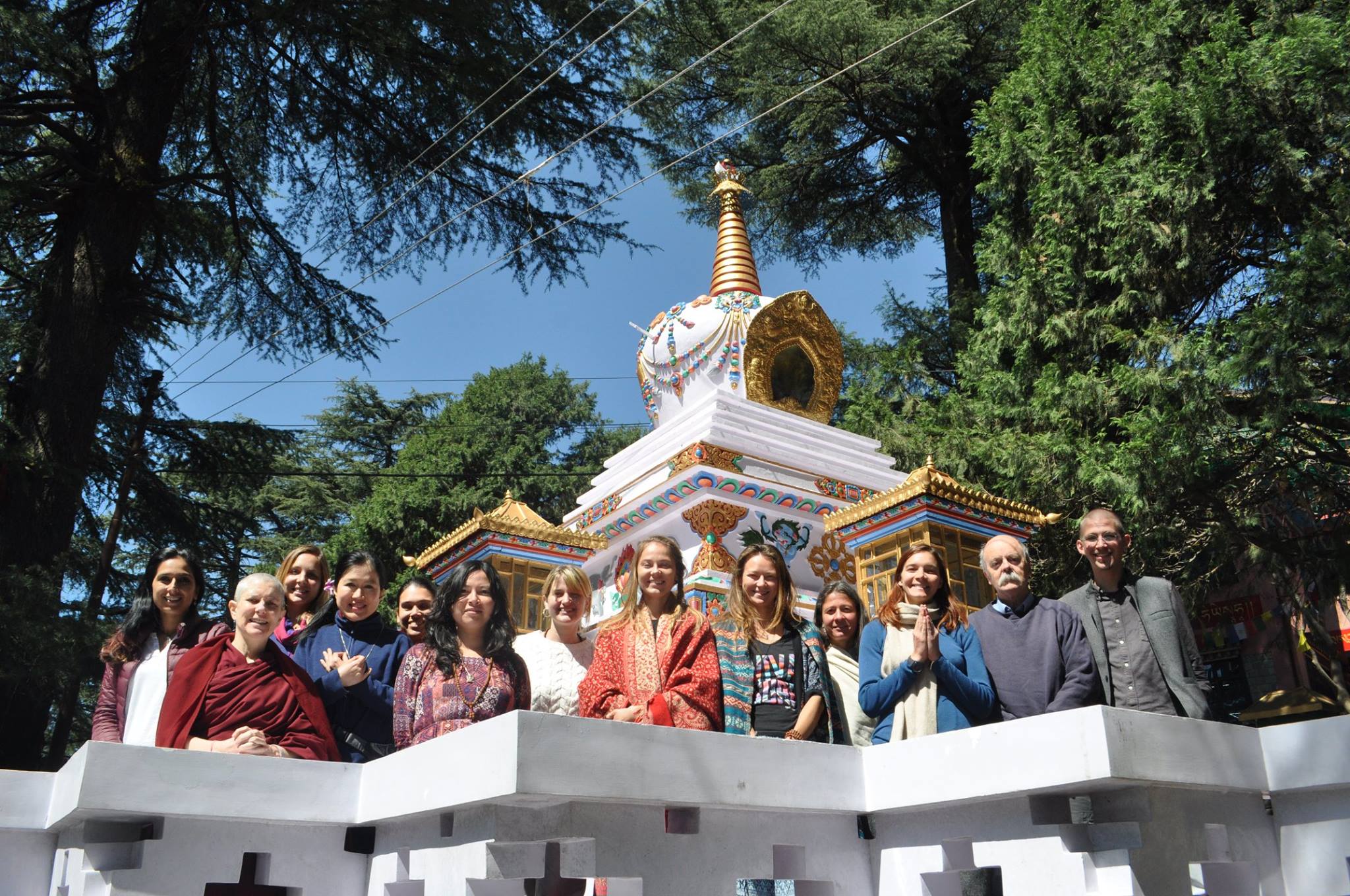
Medicine Buddha Retreat participants with Ven. Drolma course leader and Renato Unterberg meditation teacher (on the right)
You chose Mahayana Buddhism although there are many different spiritual paths and methods, such as vipassana that is very popular nowadays or Theravada Buddhism. What makes the Mahayana practice so special to you?
We grow up having to be very competitive, with a „me first“ feeling. According to the Mahayana Buddhism this attitude leads to suffering. The fact is that there are numberless other beings out there and they also want to be happy, just like me. Learning to transform the self-cherishing attitude and to benefit others more instead, that is the real source of happiness for ourselves and this planet. The happiness of giving is often much more fulfilling than the feeling of receiving, isn`t it? Mahayana Buddhism is a path that teaches that by making others happy, I become happy. Of course, these other buddhist paths you mentioned are not less special; they all belong together, are building on each other.
I liked that aspect of Buddhism too when I took a meditation course. However, there are doctrines or phenomena such as deities, karma or reincarnation for example, which might be a little bit more difficult to accept. What if eventually I cherry-pick what I like about Buddhism and other religious traditions and simply refuse what I dislike?
Well, Buddhism is quiet vast! The subjects are very profound and it takes a fairly long time to truly understand its different aspects. In the beginning it is probably a good idea to stick with what makes sense to you, to integrate in your life what seems beneficial for you and work with that.
But we should not pick cherries in order to put together our own picture too much. In the end that doesn´t work. Eventually we just end up with lot of different cherries without knowing what to do with them really. It would be merely a spiritual trip, a sort of spiritual materialism.
One of my teachers said: If you are in a desert and want to find water, you take a shovel and start to dig a hole. After a while, if you don´t find water in one spot after some time of digging, you might move somewhere else to dig again, and again somewhere else after that, but still you do not find water. So why is that? The point here is: you failed to find water because you did not dig deep enough! In the end you end up in a desert full of shallow holes. But if you persevere, digging long enough with effort, you will eventually discover that it slowly gets moist and eventually water will burst out to you, having discovered the water source. It is the same with our mind. But this needs perseverance and the right method.
This world is like a supermarket full of spiritual options and that can become a bit difficult for us to choose. We´ve got to be careful not to jump from one to another until we might give it up altogether.
I agree. There has been a spiritual boom occurring in the Western world. Why is that?
Meditation is a method that teaches how to find inner wholeness. These days many people, realise the dissatisfactory nature of worldly life and look for something more. Even though they seem to have good relationships, money and a good social status, there is something missing in their life. On the outside they might have everything, but on the inside they feel empty. That is very sad but very common. However, on the other hand, if you are satisfied and whole within, then even if you have very little on the outside, your life is fulfilled. We do not grow up with methods teaching us how to do that. Instead, we grow up with a feeling that we are never good enough.. which is not true. We are always good enough.
Isn´t it too far from the Western mind though? You know, sometimes I have a dilemma whether it is right to dedicate myself to Buddhism although I was born and raised in the Christian faith.
Yes, also the Dalai Lama initially says you should not neglect your own culture and worldview. Often that brings problems rather than solutions. His Holiness says better to stay with your own religion and culture! Of course, if you don´t find what you look for in your traditional environment or system even if you look thoroughly, then it´s probably OK to look for methods in a different environment and culture. But the point is to search properly and be sure.
Religion is one thing, but beyond that: I think it is our responsibility as the young generation of this world to thoroughly check what the real source of true happiness actually is. Fame, status, money, the fleeting temporary pleasure of partying and drugs.. is that really it? Is that all we can do? Is it truly important how I present myself on Facebook, what others think of me? Isn`t that all just a meaningless game, neverending and exhausting? I believe it is much deeper than that, I believe it is time to change our attitude and live up to our inner potential as human beings. It is high time, for ourselves and this planet.
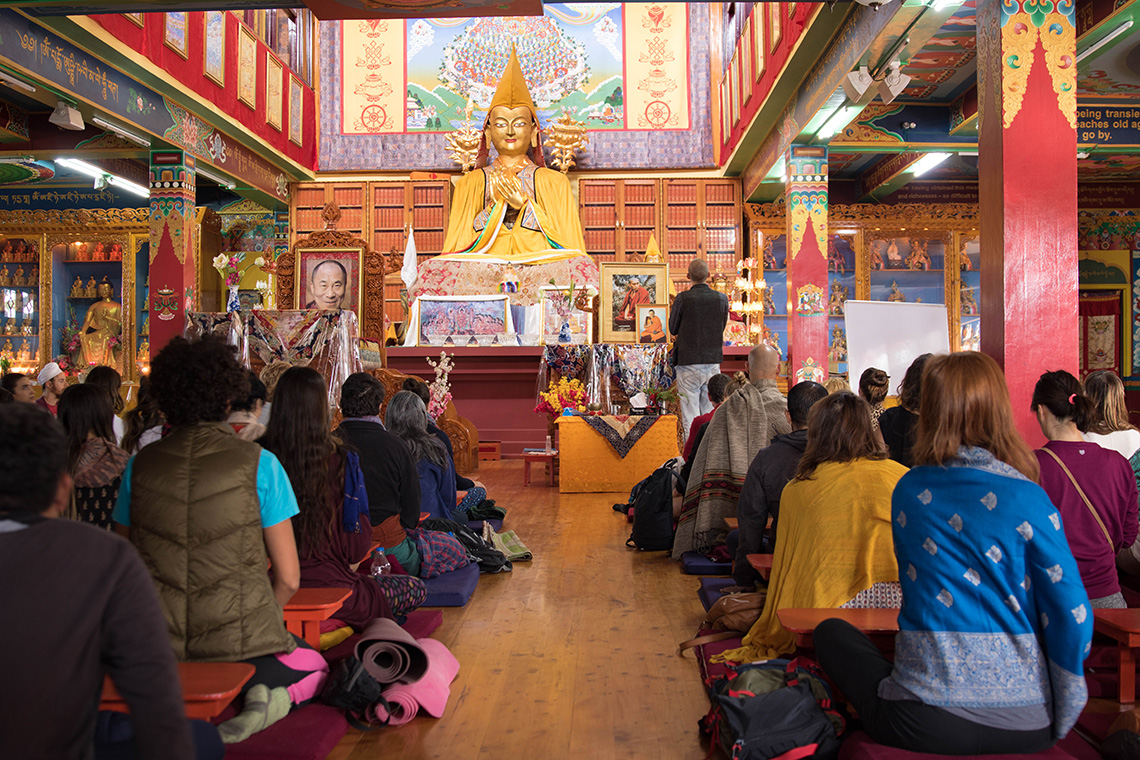
Morning meditation with Renato
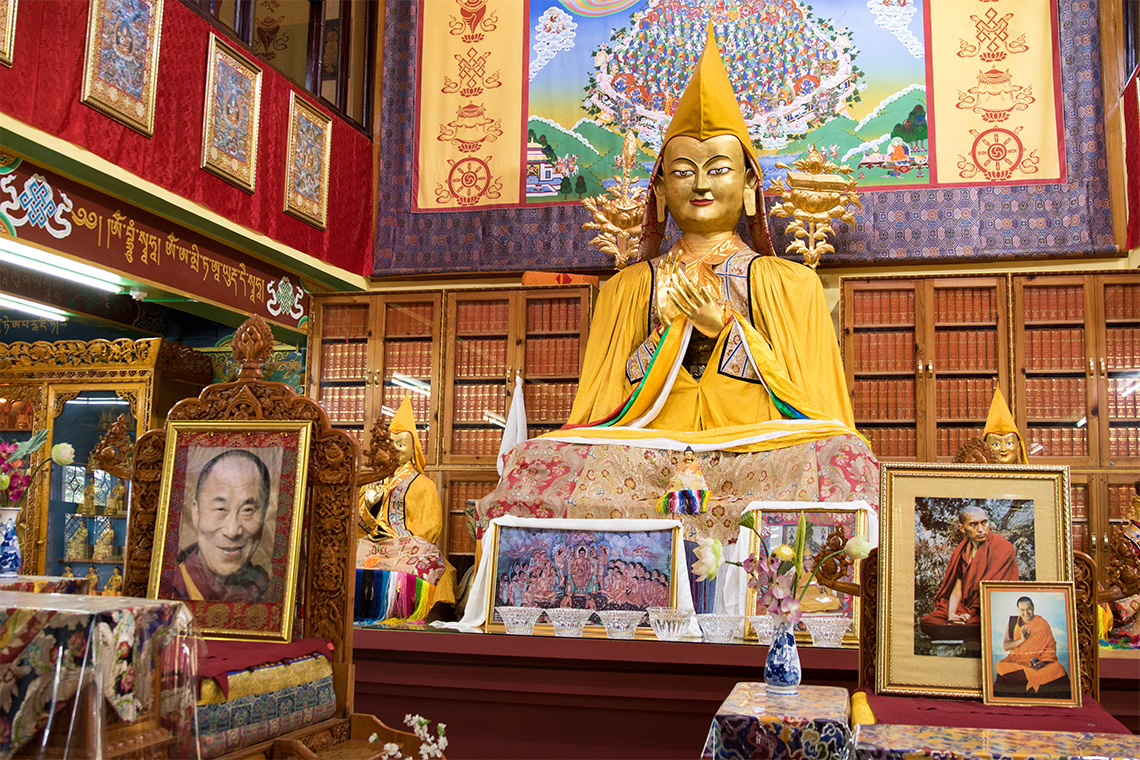
Does lasting happiness really exist?
The Buddha says it does. He says lasting happiness is our actual true nature. But it is on us to find that out ourselves, isn`t it? We have to know how to look. The nature of our mind is like the sky, vast and immaculate; but mostly it is completely covered with clouds of emotions, heavy fog and storms of involuntary thinking. But behind that the sky, our inner purity, is always present no matter what. We just don´t see it because we identify with the clouds!
We should learn to get in touch with this vast inner sky. The clouds are always changing, constantly moving, we should learn not to identify with these changes! Let´s say these clouds symbolize our grumpiness, our sadness and distress: Don´t identify with them, because they are not you! No matter what happened to you in your life, even if it was horrible, that is not what you actually are.
Inherently you are beautiful and you should start to believe it. You have to learn how to find out about your inner beauty; it is connected to all existence. We are absolutely worthy of being happy. Meditation is the tool to discover this inner goodness.
Is meditation suitable for everybody?
I think it is, it just depends what kind of meditation suits which individual; we´ve got to start somewhere. The word “meditation” literally means “to get to know” or “to familiarize with”. It is the technique to familiarize ourselves with our own mind, and that is definitely suitable for everybody!
How often should a beginner meditate?
For beginners it´s good to keep the meditation sessions short, let´s say 10-15 minutes. Do less time in one session, but enjoy it and make it a habit to do it continually, every day. In the early morning the mind is clearer, the evenings before going to sleep are also a good time. It´s about continuity: If you do it on regular basis and learn how to do it correctly, your inner life will slowly start to change.
Currently, Renato studies Buddhist Philosophy at the Instituto Lama Tzongkhapa in Italy and he´s recording a new album.
Are you interested in meditation? There are plenty of great courses at the Tushita Meditation Center in India, in the Kopan Monastery in Nepal and other FPMT Centers.
 |
Do you like useful and stylish travel gadgets? Download my FREE e-book and get inspired by a list of 22 cool travel accessories that will make your travels easier, pleasurable and more fun. |









